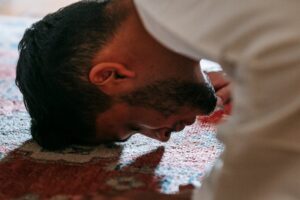The Five Pillars of Practicing Islam:
In Islam there are five acts of worship which are mandatory on every Muslim. Excused from some of these practices are people of illness, under duress, being unaware, those travelling, children under puberty, and people facing general unpreventable problems.
These five acts of worship are: The Witness, Prayer, Charity, Fasting and Pilgrimage. The prophet Mohammad (PBUH) said: “Islam is built on five (Pillars): to witness there is no God but Allah and that Mohammad is his messenger, to perform prayer, give charity, fast (month of) Ramadan and perform pilgrimage for those who can afford it (financially).” Hadith narrated by Imam Bukhari.
The Witness; (Shahadah):
- The Witness (Shahadah) is the declaration of faith by the person who accepts Islam as his/her religion.
- This is a verbal statement that will be said publicly.
- The reference to accepting Allah as the only God and Mohammad as His messenger is the core of accepting Islam as a whole. It is to be declared by each Muslim by saying: “I bear witness there is no God but Allah, and I bear witness that Mohammad is the messenger of Allah.”
The Prayers; (Salat):
- There are five daily prayers performed at different times:
- Dawn, (Fajr)
- Noon, (Zhur)
- Afternoon, (Asr)
- Sunset, (Maghreb)
- Evening, (Isha)
- Before prayers are performed each person must:
- Face the Sacred Mosque in the city of Mecca (Qiblah.)
- Cover body; for females all of the body except face and hands – for males between chest and knees.
- Ablution; a simple wash of face, hands and feet.
- The place of prayer must be clean.
- The prayers include standing and reading the opening chapter of the Holy Quran, bowing and praising God and prostrating on the floor with forehead touching ground and praising God.
- Only one prayer includes a sermon and it must be attended by males in the Mosque. It is the Friday noon prayer.
- Prayers do not require clergy. It is meant to be accessible to anyone anywhere so that he/she can establish their relationship with God on an individual or group basis.
The Charity or Almsgiving; (Zakat):
- Charity is an amount of money to be given to the poor or needy. 2.5% for the amount saved in a year if it exceeds what is equivalent to 3 oz of the current value of gold, must be given as charity (Zakat) to the poor.
- This charity applies on all kinds of jobs and businesses including farming and raising cattle.
- Charity is meant to purify our wealth. Allah said: {take from their wealth a charitable offering to cleanse them and purify them thereby.} 9:103.
- The redistribution of wealth helps strengthen the relation between people and society.
- Charity is of two parts; the obligated part which is the 2.5% and the non-obligated or voluntary part. Every Muslim is urged to give and donate money for all righteous causes.
Fasting; (Sawm):
- Muslims fast during the month of Ramadan. It is the ninth month in the Muslim lunar calendar. {It was the month of Ramadan in which the Quran was [first] sent down as guidance for all people, having [in it] clear proofs of [divine] guidance and the criterion [for right and wrong]. So whoever among you bears witness to the month shall then fast it.} 2:185.
- Fasting means to abstain from food, liquids and sexual relations every day during the month of Ramadan from dawn till sunset.
- During the month of Ramadan the Holy Book for Muslims was revealed; The Quran. Muslims perform extra prayers for long periods of time reading the Quran every night during that month.
- Fasting is meant to help you be more conscious of God, to relate to the less fortunate in the community, to develop self-discipline, learn patience and attain peace and tranquility of the mind, body and soul.
- Muslims celebrate one of the two holidays per year after completion of fasting the month of Ramadan. It is called the Festival of Breaking Fast or (Eidul-Fitr.)
Pilgrimage; (Hajj):
- A trip to Mecca where the Sacred Mosque is located is mandatory on every Muslim once during their lifetime. Only those who are financially unable to afford the expenses and ill people are excused from this trip.
- Pilgrimage includes walking around the Sacred Mosque (Kaaba) for seven rounds, walking between the two hills of Safa and Marwa seven times, standing on the mountain of Arafah for half a day, throwing pebbles at the location where Abraham threw pebbles at Satan, shaving the hair for males and sleeping in a tent in the land of (Mina.)
- Muslims during pilgrimage (Hajj) meet other Muslims from all over the world. Males are unified in their dress, a simple two pieces of unstitched cloth that erases differences between them.
- Hajj rites commemorate the remarkable obedience, submission and sacrifice of Prophet Abraham and his older son Ishmael.
- Muslims celebrate another festival on the 10th day of the 12th month (Zul-Hijjah) of their lunar calendar. Sacrifices are made to Allah by following the path of Abraham by slaughtering a sheep and distributing the meat to the needy, and to neighbors and family.
By Sh. Kifah Mustapha




